Doing More With More
From its founding 50 years ago, this Portland, Oregon, screw machine job shop has held fast to a philosophy of diversification. The theme carries across its equipment selections, processing decisions, personnel selection and customer base. It's an interesting example of successful application of multi-processing equipment by a multi-dimensional company.
That the screw machine business, she ain't what she used to be, comes as no surprise to most of the thousands of shops that constitute this important segment of the metalcutting industry. In many cases, the traditional lines of distinction between a screw machine shop and a general-purpose machine shop are blurring.
Testimony to this comes from the trade association that represents the screw machine business. Formerly the National Screw Machine Products Association, the name changed a few years ago to the Precision Machined Products Association.
The association's new moniker better reflects the evolving nature of the screw machine business. Customer demands for tighter specifications have led to the emergence of technologies that allow routine manufacture of screw machine parts which conform to these tight tolerances. Many of the parts produced in today's screw machine shop indeed deserve to be called precision.
An example of this new breed of precision machined parts shop is Enoch Manufacturing Company, located in the beautiful Northwest, near Portland, Oregon. The business started in 1949 when three brothers-in-law started making parts in a basement. From the three founders, the company has grown to well over 100 employees who occupy a plant with 48,000 square feet of manufacturing area. They work in brass, steel, stainless, aluminum and plastics in sizes from 1/32 inch in diameter to 2 inches.
We visited Enoch and talked with one of the founders' sons, Rick Dawes, general manager, about how Enoch has survived and thrived for 50 years in the competitive screw machine business. Their methods are based on good business practice, of course, but in addition they practice a philosophy of diversification that encompasses more than a wide selection of machining process options. It is core to virtually every detail of the business.
What's Diversity?
According to Mr. Dawes, "Enoch's philosophy of keeping options open by diversifying was articulated very early in the company's history." One could speculate that the philosophy was formulated in part because of the founders' familial relationship (in an effort to keep their respective options open). Regardless of its origin, the idea has served the company well for half a century.
In a broad sense, Enoch uses diversity to define their business on several levels. For example, the shop has CNC Swiss-type machines, single and multi-spindle automatics and rotary transfer. Often a screw machine shop tends to specialize in one of these machining classes, but generally, it's unusual to find them all under one roof. In addition, they have CNC machining available on a contract basis.
"Our location here in the Northwest mostly explains why we became so broad-based," says Mr. Dawes. "The relative isolation of this part of the country has led to development of close relationships between manufacturers and suppliers. We've worked with many of our customers for 30 to 35 years. As their businesses have grown and their manufacturing needs broadened, we grew our business with them. We evolved manufacturing services and process techniques to keep upping the level of service we can provide. That helps us differentiate ourselves in the marketplace and gives us a more stable customer base."
A Double-Edged Sword
Having processing diversity can be a blessing and it can be a curse. The up side of offering numerous process choices is that a larger variety of work can be manufactured. On the down side, it's sometimes more difficult to get all of the efficiency from a given process that a specialized shop working exclusively with one screw machine type may be able to achieve.
"On balance," says Mr. Dawes, "we find that, for our market, breadth works better for us. Customers need an increasing array of solutions and prefer to deal with a decreasing number of suppliers to get the work done."
Moreover, advances in machine tool technology have played into Enoch's hand as well. "We have been steadily implementing advanced CNC screw machines and Hydromat rotary transfer machines into our production mix," says Mr. Dawes. "A major benefit of more advanced machines has been a shift in the skill sets required by many of our machinists. Training focus is now much more directed toward electronics, programming and computer skills. That allows us to better cross-train people to work on Swiss-types, multispindles or rotary transfer as needed. Counter to the national trend, we have a waiting list of people wanting to work in our shop."
Teaming Up
Enoch has an extensive engineering department. It too has evolved as a customer driven service extension of the parts-making side of the business. Many of Enoch's customers have tried to reduce their engineering overhead by shifting some of the responsibility to suppliers.
"It makes good business sense," says Mr. Dawes. "Our engineering staffing costs can be spread over our entire customer base. In addition to working with customers on designing for manufacturability issues, our engineers are assigned to work with machinists in the shop to optimize processing efficiency. Most of our engineers can lay out jobs for all of the different screw machine types we have. It gives us production flexibility."
The team concept extends to the shop floor. With an average employee tenure of 12 years, there is much experience available to tackle new jobs and to re-evaluate old jobs.
The shop floor is loosely organized into departments based on screw machine types. There's a Swiss department, multispindle department, single-spindle department and rotary transfer. These departments are not insulated from each other. There is motivation for the various "departments" to communicate.
Enoch is an open book company—meaning everyone knows the financials and participates in gain sharing and profit sharing programs. Therefore, it's in each employee's best interest to make the most profit on a given job. Departmental ownership of a job becomes secondary to best practice. Being able to move jobs across different equipment gives the company scheduling flexibility that results in better delivery response.
Optimization—Use What's Available
One of the difficulties of trying to manage a shop with the processing diversity of Enoch is efficiently scheduling work in such a way as to balance the use of various machine types. Too much Swiss-type work, for example, will bog down that area of the plant while the multispindle area may need work. It's a constant balancing act.
To help them utilize resources efficiently, Enoch applies a process they call optimization to the allocation of work in the plant. While admittedly this system is not foolproof, it does serve the company as a guideline.
In general Enoch's idea of optimization involves how to best schedule its various machine types efficiently to help balance production and meet delivery. Delivery calls the tune in this system. Looking at a set delivery date, the scheduler then looks at available times on various machines. In our example, let's use a Wickman, Tornos six-spindle and a Hydromat rotary transfer.
The Hydromat would be the most cost-effective machine from a production perspective because it can do our example job in a single run. The other two machines need to go to MSOs for secondary operations. Unfortunately, the Hydromat is loaded with work past the due date. Its efficiency is overridden by the need for on-time delivery.
Next the scheduler looks at the Tornos and sees that it has some time available but not enough to make the run. In this scenario, the job goes on the Wickman, which has enough time available.
"The beauty of this system is that when the job comes through again, it may well be put on the Hydromat or Tornos if they are available," says Mr. Dawes. "Quoting of the job is designed to reflect an averaging among the potential machines. Of course, this system assumes a few things, such as, can the part actually be run on each of the machines and is each machine capable of meeting the customer's tolerance and finish specifications?"
Everyone in the shop is aware of the optimization system. Teams take it as a challenge to try and make jobs profitably on machines that aren't perfect for the application. Teams are encouraged to internally vie for jobs if they can make the part more efficiently than another department. It's created some real innovation in setup, tooling and processing techniques.
"There's incentive to match the job and machine as perfectly as possible but, at the same time, our diversity allows us to foster an environment of thinking outside the box," says Mr. Dawes. "It has led our machinists to get performance from these machines that is baffling even to the machine builders."
Liberal Arts Training
One way Enoch gets people to think outside the box is to hire people who are not the obvious profile for a machine shop. They practice a concept one might call liberal arts training.
The candidate profile that Enoch is looking for is much less centered on shop skills. Instead, the company is looking hard at people who have the interpersonal skills to work in the team environment that is key to Enoch's technical success.
"The way I look at it," says Mr. Dawes, "as fast as technology is changing in metalworking generally and the screw machine business specifically, much of the available formal technical training is close to obsolete when we get a graduate. I prefer to enroll the right people in our in-house training program and teach them about our technical requirements. We feel the right personality to fit our team-based environment trumps formal technical knowledge."
This approach carries to quality control as well. At Enoch there are four people who consult with the machinists about quality issues. QC acts as a measurement training force as well. Use of gages, roundness testers, surface measurement equipment and other items is left to the machinist. The company has 13 networked information stations located throughout the shop where SPC data is collected and viewed as well as ISO procedures.
"The idea," says Mr. Dawes, "is to establish accountability for the work with the machinist. It also speeds throughput because there is less delay getting measurement confirmation to the shop floor."
You Can Pick Your Friends
Among the principles laid down by Enoch's founders was to maintain a diverse customer base. To that end, the company is careful not to put too much of its business with any one customer or within any single industry.
Enoch has no formal sales force. Business comes in primarily through word of mouth. Of course, 50 years in the business tends to allay fears of supplier stability.
The company's ability to service a broad customer and industry base is made possible, in large part, to the region they serve. While aerospace tends to dominate the conventional view of the Northwest, there is much more manufacturing diversity than meets the eye.
"While two-thirds of our business comes from the Northwest region, our rule of thumb," says Mr. Dawes, "is to place no more than 10 percent of our business with any one customer and no more than 20 percent within any single industry." As a result, Enoch is involved with more than 250 active customers. They serve aerospace, communications, computer, dental, electronics, medical, sporting equipment, test and measurement, and transportation industries. More than 4.5 million parts are shipped each month.
Where To From Here
The traditional screw machine business is changing. Batch volumes of parts are moving down in favor of higher mixes of parts. Enoch has managed, by implementing CNC technology and Hydromat rotary transfer machines, to compress the pre-production setup and post-production tear down to a point were general turnaround for a job is four weeks.
"To accommodate the breadth of customers and variety of parts that we make," says Mr. Dawes, "dedicating resources to a given job on a specific machine is not practical. We must be able to flexibly apply our machines to a range of work to be successful."
Enoch, like most screw machine job shops, sees the trends toward lower run quantities ordered in scheduled (JIT) intervals as accelerating. They also believe the trend toward using fewer suppliers for more service will continue. In addition, application of CNC and rotary transfer technology, doing complete parts in a single setup to reduce secondary operations and multiple handling, will continue to help alleviate the pressure for shorter deliveries.
"Shops in our industry segment," says Mr. Dawes, "must look holistically at the business and seek to find solutions on all levels of the enterprise. Employees must be motivated to assume risk without fear in order to move the company and its application technology forward to reduce cost and increase profit." Is he right about your shop?
Read Next
The Cut Scene: The Finer Details of Large-Format Machining
Small details and features can have an outsized impact on large parts, such as Barbco’s collapsible utility drill head.
Read More3 Mistakes That Cause CNC Programs to Fail
Despite enhancements to manufacturing technology, there are still issues today that can cause programs to fail. These failures can cause lost time, scrapped parts, damaged machines and even injured operators.
Read More




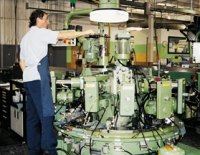
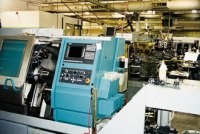
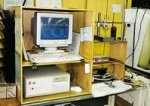
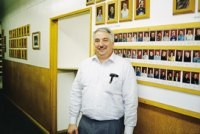
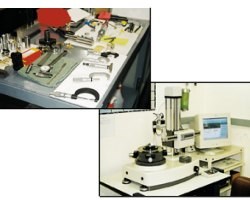
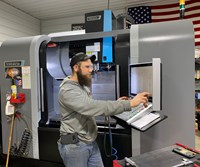
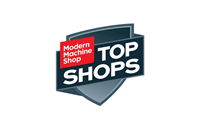



.png;maxWidth=300;quality=90)






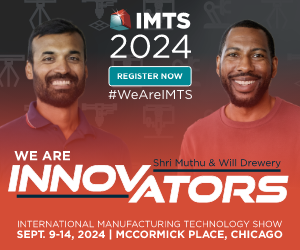
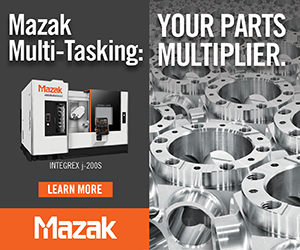

.png;maxWidth=300;quality=90)




